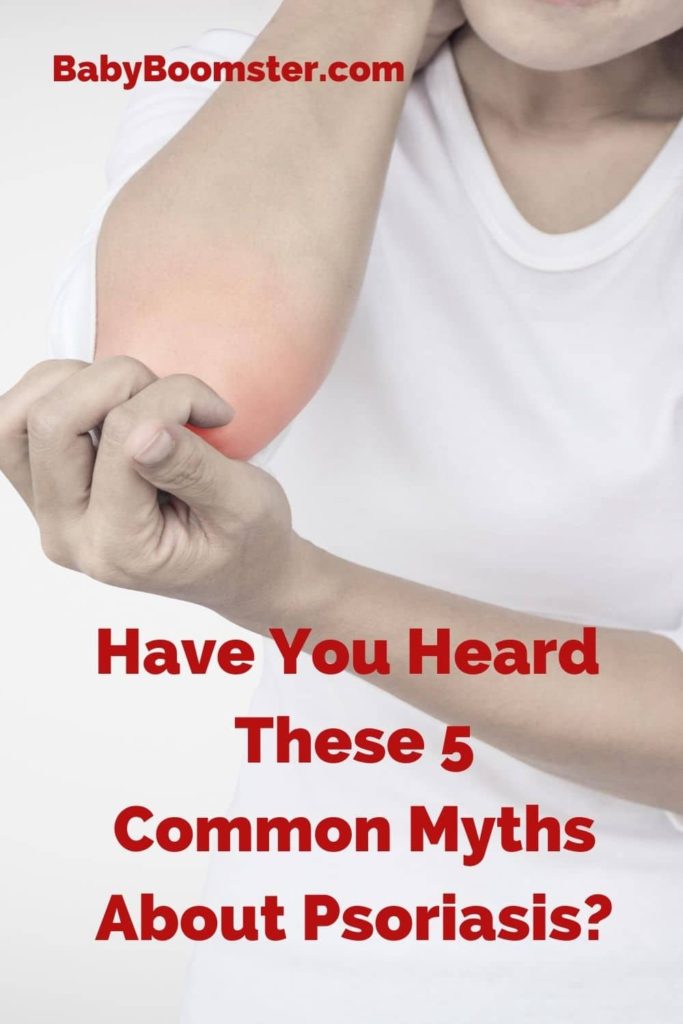Psoriasis Awareness Month is in August. Learn the facts behind some of the most common myths about this chronic skin condition.
Dry skin is common with age and is often linked to seasonal changes, hormonal shifts, and even diet. Symptoms like itching, redness, and irritation come and go, but for some, they are a lifelong struggle.
Psoriasis is a chronic condition characterized by red, scaly patches of skin. For millions of sufferers, it’s more than just a skin problem. The condition affects over 8 million people in the United States alone including celebrities like Cyndi Lauper and Jerry Mathers.
As common as it is, psoriasis is frequently misunderstood. Some patients even report a deteriorating quality of life because of it.
August is Psoriasis Awareness Month and the perfect time to improve your understanding of this condition and how it affects those who live with it. Here are some of the most common misconceptions.
Myth #1: It’s primarily a skin condition
Though psoriasis symptoms most commonly affect the skin, it isn’t actually a skin condition. It is an autoimmune disease that causes skin cells to regenerate at a faster than normal rate. This results in the buildup of dead cells on the skin’s surface which form scaly lesions that often become inflamed.
Environmental factors like weather, stress, alcohol consumption, and injury to the skin can trigger a flare-up, even in people who have been symptom-free for years.
Myth #2: It always causes red patchy lesions
Red patchy lesions and scaly buildup of dead skin cells are the hallmark symptoms of plaque psoriasis, the most common form of the disease. However, psoriasis doesn’t always appear that way, depending on what type you have. Nail psoriasis causes abnormal nail growth, pustular psoriasis produces pus-filled lesions, and psoriatic arthritis causes swollen and painful joints.
Myth #3: Psoriasis and eczema are the same things
Itchy areas of red, inflamed skin are characteristic of both psoriasis and eczema, but they are fundamentally different conditions. Psoriasis is an autoimmune disease resulting in the overproduction of skin cells. Dead cells build up on the skin’s surface in scaly patches that often become inflamed.
Eczema is the result of a hypersensitive skin reaction and doesn’t result in scales. Both may occur anywhere on the body and can cause intense itching.
Myth #4: It only affects adults
Family history is one of the biggest risk factors for psoriasis, but it can develop in anyone at any time. The condition typically develops between the ages of 15 and 25, but psoriatic arthritis tends to manifest a little later, between the ages of 30 and 50. Only 10 to 15 percent of cases develop before age 10 and psoriasis is considered rare in infants.
Myth #5: It can be cured
Psoriasis is a chronic condition that cannot be cured but it can be treated. It typically cycles through flare-ups and periods of remission, sometimes for years at a time. The goal of psoriasis treatment is to stop the skin cells from growing too rapidly and to address physical symptoms.
Dermatologists will often recommend topical anti-inflammatories and hydrating creams made with corticosteroids or retinoids. Light therapy may be prescribed for moderate to severe psoriasis and oral or injected medications can be used when other treatments fail.
Though psoriasis affects over 2 percent of the American population, it is poorly understood even by some who suffer from it. The stigma surrounding psoriasis is a symptom of that misunderstanding.
Find relief from psoriasis inflammed skin, on Amazon, here.
Have you or someone you know experienced this skin condition? Do you have any tips or insights on how to deal with it? Please leave a comment below.




Luckily, I don’t have psoriasis, but I do get stress-related eczema on my hands. It flares up when too much is going on, like during our last move in May. It goes away as the stress goes away, but while I have it, the itching drives me mad.
Thanks, Jennifer. Stress can really mess with your skin and excema is sort of similar in a way.
Wow, Rebecca, this was ALL news to me! I realize I knew nothing about psoriasis!
Thanks, Diane. It’s good to know about just in case.
You’re right, psoriasis can’t be cured but it can go into remission, it did for me for over 10 years. Also, it’s possible to have psoriasis & atopic dermatitis, something I’ve learned as I’ve gotten older. I’m lucky, so far my psoriasis has stayed mild, kept under control w/the the two recommended types of shampoos & topical treatment.
A fact you didn’t mention is that one of the Surgeon General reports on tobacco use (in the 1960’s) indicated that psoriasis can be triggered or is more likely to occur in a smoker. No MD ever mentioned that to me (I smoked at one time), including the board-certified dermatologist I went to to confirm (or not) the psoriasis diagnosis when my symptoms returned. I only learned of it when I was in what has, so far, been my last & successful quit effort, I was looking online for reading materials to read/look at when I was feeling urges to smoke– on a British quit/anti-smoking website. There were many disorders/conditions that might be triggered/caused or made worse by smoking on that list. I read it fairly often in the first few months. I don’t know if smoking pot/marijuana (legal where I live) has the same effect, although any leaf/stem, etc., will probably form some of the same chemical compounds when burned, but cigarettes in the US have other chemical compounds added by cigarette manufacturers.
Wow! Great information! Thanks for sharing. Smoking, in any form is a major cause of health issues from psoriasis to cancer. Thanks for bringing that to my attention.